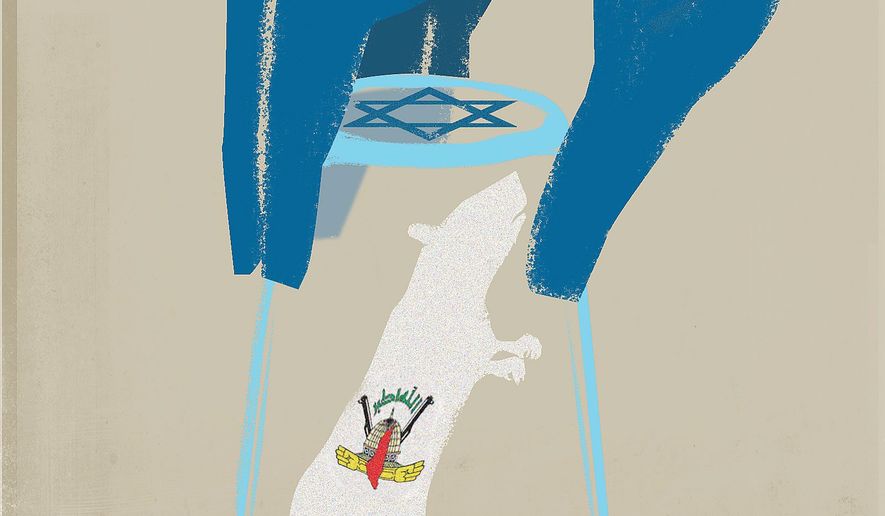OPINION:
In Gaza last week, Israel fought a battle but not against Hamas. That’s the news. The rest will be commentary.
The battle was between Israel and a group known as Palestinian Islamic Jihad or PIJ (pronounced like the first syllable of pigeon), a terrorist organization (so designated by the United States, the EU and others) whose goal is burn Israel to the ground and establish an Islamic state on its ashes.
PIJ is Hamas’ ally, but also Hamas’ rival. Estimated to have 6,000 fighters compared to Hamas’ 30,000-man army, it was founded by Palestinians inspired by the 1979 Islamic Revolution in Iran.
Since then, it has been supported and directed by the theocrats in Tehran who regard the annihilation of Israel as a goal that unites Islamists, whether Shia like themselves, or Sunni such as PIJ and Hamas.
Hamas is more tolerant of PIJ than of its Sunni ally/rival, Fatah, the controlling faction in the Palestinian Authority. In 2007, Hamas and the PA/Fatah went to war over who would rule Gaza. When the smoke cleared and the blood dried, Hamas was the victor, and today PA President Mahmoud Abbas dares not set foot on Gazan soil.
While Hamas leaders also look to Tehran for backing and are respectful of the ruling mullahs, they do not welcome PIJ escalating the conflict with Israel either on orders from those mullahs or its own initiative. The conflict last week is the result of PIJ doing exactly that.
In the past, Israel has enforced a rule: Since Hamas controls Gaza, Hamas will be held responsible for any attacks coming from that territory. This time around, Israel made an exception.
Khaled Abu Toameh, for my money the most knowledgeable journalist covering the Palestinian-Israeli conflict, reported that Israel, via Egypt, communicated to Hamas leaders that so long as they refrained from joining PIJ in this latest round, they would not find themselves in Israel’s crosshairs.
Tension between the two terrorist groups went public Friday, when Mahmoud Zahar, a senior Hamas official, attempted to pay his condolences to the family of Baha Abu al-Ata, a top PIJ commander assassinated three days earlier in a pre-dawn Israeli airstrike.
PIJ supporters blocked his car, threw rocks and chanted anti-Hamas slogans. Mr. Zahar’s bodyguards hustled him away.
Israeli officials blame al-Ata for numerous rocket and sniper attacks on Israeli cities and towns over many years, and as recently as early this month.
Brig. Gen. Hidai Zilberman, a spokesman for the Israel Defense Forces (IDF), told an Israeli news outlet that al-Ata had been a “ticking bomb.” Israeli Deputy Defense Minister Avi Dichter added: “We had to make sure PIJ would understand that they can’t shoot at Israel whenever they want.”
PIJ’s initial response was to fire an additional 450 missiles at Israeli residential — not military — areas. Israel’s Iron Dome missile defense system knocked out most. Israel also retaliated in a 48-hour operation code-named “Black Belt,” hitting PIJ weapons factories, storage facilities, training centers, and the homes of PIJ operatives.
No military in the world is more surgical than the IDF, but PIJ, like other terrorist groups, uses human shields which virtually ensures that some non-combatants will be killed. Israel’s enemies then charge Israelis — not PIJ — with war crimes.
Late last week, Egypt brokered a ceasefire which, as I write, appears to be holding. What has this most recent battle changed?
First: It seems to me that Israel has reinforced deterrence, a key objective. Its national security professionals have demonstrated that they are hard at work despite the fact that Israel’s politicians, after two elections, remain unable to form a coalition to replace the caretaker government led by Prime Minister Benjamin Netanyahu.
Second: Mr. Netanyahu’s longstanding strategy vis-a-vis Hamas — sometimes called “mowing the lawn” — has again proven itself the least-bad option. More hawkish Israelis have called for defeating Hamas once and for all. But if such decisive action led to either PIJ taking over Gaza, or Israel having to assume responsibility for the territory, the victory would be Pyrrhic.
Hamas remains Israel’s sworn enemy. But its restraint in this instance suggests that its leaders see an informal truce as in their interest. How long that might last is hard to say. They will not want to give even the appearance of having lost their jihadi zeal.
Why do they now want what the Israelis call “quiet for quiet?” Probably just to re-arm for the next round of conflict. Is it possible that Hamas wants to spend some time and resources alleviating the poverty and squalor that has deepened in Gaza over due to years of conflict? I’ll believe it when I see it.
One more outcome: Tehran’s imperialist ambitions have suffered a setback. Israel has dealt its most obedient proxy in Gaza a serious blow. This comes at a difficult moment for the theocrats. In Lebanon, even the Shia community is protesting the economic corruption and mismanagement of a political elite headed by Hezbollah, the theocrats’ satrap. In Iraq, demonstrations continue and are being directed specifically against Iran’s presence and power.
And inside Iran over recent days, protests have been growing — both in number and violence — in reaction to the economic hardships imposed by a regime obsessed with revolutionary empire-building. Among the chants: “No to Gaza, no to Lebanon, my life is for Iran!” and “Oil money is gone! Spent on Palestine!” Come to think of it, that too, is news, not just commentary.
• Clifford D. May is founder and president of the Foundation for Defense of Democracies (FDD) and a columnist for The Washington Times.




Please read our comment policy before commenting.